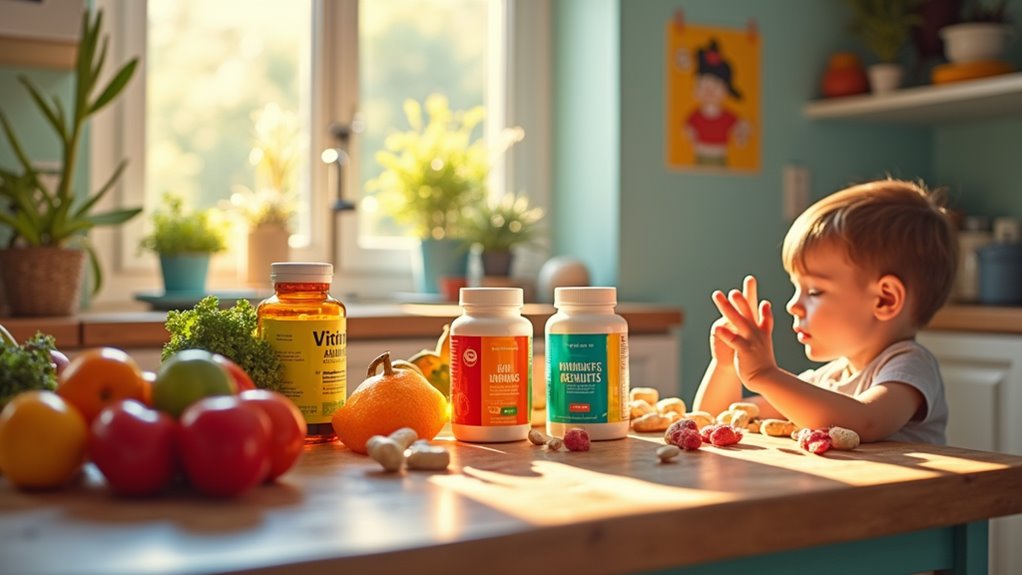You might think your kids need vitamins and supplements, but that's not always true! Many kids get all the nutrients they need from a balanced diet of fruits, veggies, and whole grains. Vitamins can't replace the goodness of real food. Plus, too much of a good thing can be harmful—overdosing on vitamins is a real worry, especially with fat-soluble ones like A and D! And just because a label says "natural" doesn't mean it's safe, so always check with a doctor before buying. Stick around, and you'll uncover more helpful info about keeping your kids healthy!
Vitamins Substitute for Healthy Diet
Many parents believe that vitamins can fill the nutritional gaps in their kids' diets, but this misconception can lead to unhealthy eating habits. It's easy to think, "Hey, if my kid takes a vitamin, they'll be fine!" But relying on vitamins might make you overlook the importance of real food.
Think of it this way: vitamins are like the sprinkles on a cupcake. Sure, they're fun and colorful, but they don't make the cupcake itself! A balanced diet filled with fruits, vegetables, whole grains, and proteins provides essential nutrients that vitamins simply can't replace.
For instance, whole foods contain fiber, antioxidants, and other goodies that keep your child's body humming along nicely.
If your kid starts thinking they can munch on chips and candy because they took a gummy vitamin, that's a recipe for trouble. You want them to develop healthy eating habits that stick with them for life.
So, instead of relying solely on vitamins, encourage your child to explore new foods and flavors. Who knows? They might just discover a new favorite vegetable!
All Kids Need Supplements
Not every child needs supplements, and assuming they do can be misleading. While it's true that some kids might benefit from extra vitamins, most healthy children get what they need from a balanced diet.
Think about it: fruits, vegetables, whole grains, and proteins all pack a punch of essential nutrients. If your child enjoys a variety of foods, chances are they're fueling their little bodies just fine.
Now, if your child is a picky eater, or if there are specific health concerns, then a supplement might be worth considering. But before you rush to the store, it's a good idea to talk to your pediatrician. They can help you figure out what's best for your child, which is way better than guessing.
Plus, let's be honest—pills can be tricky! Some kids might think they're a funky candy. So, instead of reaching for a bottle of vitamins as the first step, focus on the fun of cooking together or trying new foods.
Getting kids involved in their meals can make a world of difference. Remember, each child is unique, and their nutritional needs can vary, so a one-size-fits-all approach doesn't really work here.
More Vitamins Means Better Health
When it comes to vitamins, the idea that more is always better can be misleading. Sure, vitamins are essential for your child's growth and health, but piling on extra isn't a magic fix. In fact, taking too many vitamins can sometimes do more harm than good. Your kid's body only needs a certain amount, and when they get more than that, it can lead to some serious side effects.
For example, excess vitamin A can mess with their liver, while too much vitamin D might cause nausea. Yikes!
It's important to remember that a balanced diet usually provides all the vitamins your child needs. Fruits, veggies, whole grains, and proteins are where the real magic happens.
If you think your child might need extra vitamins due to dietary restrictions or health issues, it's best to chat with a doctor. They can help you figure out what's right.
Natural Supplements Are Always Safe
While natural supplements may seem like a safe bet for boosting your child's health, that's not always the case. Just because something is labeled "natural" doesn't mean it's automatically safe. You might be surprised to learn that some natural supplements can cause side effects, especially when taken in the wrong amounts.
Imagine giving your child a supplement without checking its ingredients—yikes! Some herbs can interact with medications or even cause allergic reactions.
What's more, the quality of natural supplements can vary wildly. Some might be just fine, while others could be contaminated or not contain what they claim.
It's easy to think that if it's from nature, it's harmless, but that's not true. Always talk to your child's doctor before starting any supplement. They can help you decide what's safe and effective.
Remember, a balanced diet usually provides all the nutrients your child needs. So, while that fancy bottle of "all-natural" vitamins might look appealing, don't let it fool you! Safety first, right?
Keep your little ones healthy by sticking to what's proven, and give those natural myths a good nudge aside!
Vitamins Can Cure Illnesses
Many parents believe that vitamins can work miracles, helping to cure their child's illnesses. While it's understandable to want the best for your little one, it's important to know that vitamins aren't magic pills. They can't just zap away a cold or flu.
Instead, vitamins play a supporting role in keeping your child's body strong and healthy, which can help prevent illnesses in the first place.
Think of vitamins like a team of superheroes. They each have their own special powers—like boosting the immune system or supporting growth—but they can't fight off every bad guy on their own.
When kids are sick, it's usually best to rely on good rest, hydration, and a balanced diet that includes those vitamins naturally found in fruits and veggies.
If your child has a specific health issue, it's always a good idea to talk to a healthcare professional. They can guide you on the best ways to support your child's health.
Supplements Are Only for Picky Eaters
Supplements often get labeled as a go-to solution for picky eaters, but that's not the whole story. Sure, if your child is a little food critic, supplements can help fill the gaps in their nutrition.
However, they're not just for kids who turn their noses up at broccoli. Many children might need extra vitamins and minerals for various reasons, like growth spurts, busy lifestyles, or even just a lack of variety in their meals.
It's important to remember that a balanced diet is the best way to get nutrients. But let's face it—sometimes life gets in the way, and kids mightn't eat everything they need.
That's where supplements can come in handy. They're like a safety net, not a replacement for healthy foods.
Vitamins Provide Instant Energy
Some parents believe that popping a vitamin can give their kids an instant energy boost, but that's a misconception. Vitamins are essential for overall health, but they don't work like a magic energy drink. Instead of providing immediate energy, vitamins support your child's body in various ways. For example, B vitamins help convert the food your kids eat into energy, but it takes time for that process to happen.
If your child feels tired, it might be due to lack of sleep, poor diet, or not enough exercise, rather than a vitamin deficiency. Relying on vitamins for a quick pick-me-up can lead to disappointment. Plus, too many vitamins can cause more harm than good. You wouldn't want a superhero to lose their powers, right?
Encouraging your child to eat a balanced diet packed with fruits, vegetables, whole grains, and proteins is the best way to keep their energy levels up. Make meals colorful and fun, and watch how their energy naturally flourishes!
All Supplements Are Regulated
The misconception that all supplements are strictly regulated can lead to confusion and even risk for your child's health. You might think that just because a supplement is on the shelf, it must be safe and effective. Unfortunately, that's not the case! Unlike medications, which are closely monitored by the FDA, dietary supplements don't have to meet the same rigorous testing standards before hitting the market.
This means that some supplements mightn't contain what they claim, or worse, they might've harmful ingredients. Yikes! Imagine giving your child a vitamin that's not what it seems. It's vital to do your homework before choosing supplements for your little ones.
Look for options that have been tested by third-party organizations, which can help validate the quality and safety of the product. Don't just grab whatever's on sale or has a colorful label!
Talk to your pediatrician about what might be best for your child. They can guide you to reputable brands. Remember, being informed is your superpower! After all, you want to guarantee your child gets the right nutrients without any surprises.
Food Allergies and Supplements
Parents need to be especially cautious when considering supplements for children with food allergies. While it might seem like a good idea to boost your child's nutrition, some supplements can contain allergens or other ingredients that could trigger a reaction. Always read the labels!
You might think a supplement is safe because it's in a pretty bottle, but that doesn't mean it's allergy-friendly. Some vitamins and minerals are derived from common allergens like dairy, nuts, or soy. So, if your child has a food allergy, double-check that the supplement doesn't include any of those ingredients.
It's also important to remember that not all supplements are created equal. Some might be made in facilities that handle allergens, which could lead to cross-contamination. That means your child could end up with a surprise they definitely don't want!
If you're unsure about a particular supplement, chat with your child's doctor or a nutritionist. They can help you find options that fit your child's needs without any scary surprises.
After all, keeping your little one safe and healthy is the ultimate goal!
Multivitamins Cover All Nutritional Needs
Multivitamins might seem like a convenient solution for covering all your child's nutritional needs, but they aren't a magic bullet. Sure, they can help fill in some gaps, but they can't replace the goodness of real food.
Think of it this way: you wouldn't rely on a superhero to do all your chores, right? Just like that, multivitamins can't do all the heavy lifting when it comes to nutrition.
Kids need a variety of vitamins and minerals, and the best way to get those is through a balanced diet full of fruits, veggies, whole grains, and proteins.
These foods provide not just vitamins, but also fiber and other important nutrients that multivitamins don't offer. Plus, there's something special about the taste and texture of real food that a pill just can't replicate.
Kids Can Overdose on Vitamins
Overdosing on vitamins might sound unlikely, but it's a real concern for kids. While vitamins are essential for growth and health, too much of a good thing can lead to trouble.
You might think that since vitamins come from a bottle, they're perfectly safe, but that's not always the case!
For example, fat-soluble vitamins like A, D, E, and K can build up in your body, leading to toxic levels. Imagine having too much vitamin A; it can cause headaches, dizziness, and even liver damage. Yikes!
Water-soluble vitamins, on the other hand, like B and C, are usually flushed out, but they can still cause issues if taken in extreme amounts.





